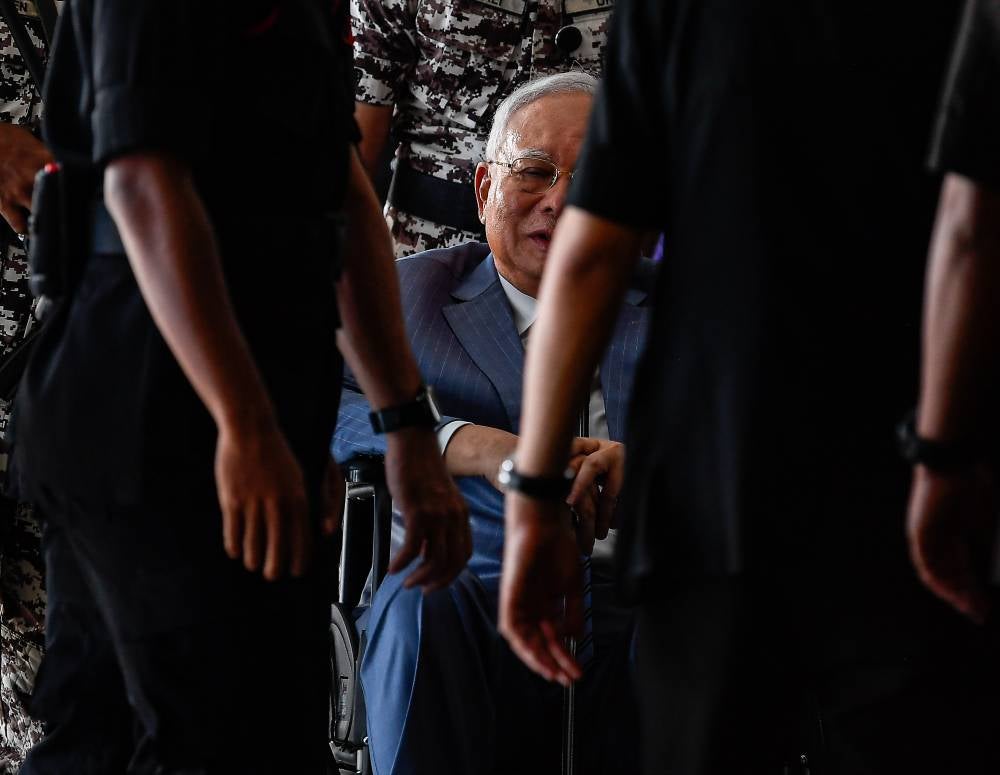Najib's apology fuels political speculation
The apology might be a strategic move to gauge public response, especially among Umno supporters, potentially setting the stage for his political comeback.

SHAH ALAM - Former prime minister Datuk Seri Najib Razak’s recent apology has sparked mixed reactions among Malaysians with some viewing it as sincere, while others perceive it as politically motivated.
Political analyst Afi Roshezry Abu Bakar said the apology might be a strategic move to gauge public response, especially among Umno supporters, potentially setting the stage for his political comeback.
There's mixed reaction regarding Najib's recent apology, with some Malaysians viewing it as a genuine move while others suspect political motives.
Political analyst Afi Roshezry Abu Bakar said the apology appeared to be a calculated attempt to see how the public, particularly Umno supporters will respond, potentially paving the way for his political return.
"We can see that, even though it's a small percentage, there is still potential for Najib to see this addendum to be materialised.
"Politics is unpredictable and we've recently had quite a number of by-elections, with the most recent in Gua Musang.
"People there are grateful for what Najib has done for them, so we're seeing mixed reactions overall," he said when contacted.
Afi said Najib’s apology could be a strategic move to gauge public sentiment, particularly among staunch Umno loyalists, as he possibly laid the groundwork for a return to politics.
He said there was a strong sense that this move was not only to regain trust but also to test the waters, especially considering the support Najib still held within Umno’s grassroots.
While some Malaysians have embraced the apology, appreciating Najib’s acknowledgment of past mistakes, he said others remained sceptical, perceiving it as a political ploy to rebuild his image ahead of a potential comeback.
Afi said even with a "slim chance" for Najib to regain political clout, the possibility could not be dismissed entirely.
"There’s a small yet significant portion of supporters who still see Najib as a leader who contributed positively to the nation.
"Some of these individuals are staunch Umno supporters and they remain hopeful he could reclaim his influence in the future," he said.
He also highlighted that Najib’s supporters recall favourable policies during his tenure and consider him a pivotal figure capable of steering the party in upcoming elections.
The mixed sentiments around Najib’s apology reflected broader divisions in public opinion, he added.
Afi observed that some Malaysians, including fence-sitters who were not aligned with any political party, were also closely watching how Najib positioned himself in light of recent events.
For these undecided individuals, he said Najib’s apology could either rekindle trust or reinforce their reservations.
Drawing parallels to Prime Minister Datuk Seri Anwar Ibrahim who also returned to politics after serving jail time, Afi suggested that Najib’s apology may be a strategic step toward shaping a similar narrative.
"We have seen political figures bounce back before. If Najib is indeed eyeing a return, this apology could serve as a key element in rebuilding his legacy and attracting both Umno supporters and the rural Malay electorate," he added.
When asked about Anwar's acceptance of Najib’s apology, Afi said the issue can be a powerful tool for any politician and Anwar was leveraging it by forgiving Najib.
He said there will be mixed reactions, some will support Anwar’s decision, while others may not.
However, I think it could indirectly increase grassroots support for Najib.
Afi further noted that while Anwar stood to gain goodwill from Umno’s side, this move may also help Najib garner more support in the future.
Anwar welcomed Najib's recent public apology regarding the 1Malaysia Development Bhd (1MDB) scandal.
Last Thursday, in a statement read out by his eldest son, Datuk Mohamad Nizar, at a press conference at the Kuala Lumpur Court Complex, Najib insisted that he was innocent and blamed fugitive businessman Low Taek Jho, better known as Jho Low and Petrosaudi executives for the debacle.
The Kuala Lumpur High Court will decide on Wednesday whether Najib must defend himself in the 1MDB corruption case, which began five years ago.
Najib, 71, is facing four charges of abusing his position to obtain RM2.3 billion from 1MDB funds at the AmIslamic Bank Berhad branch on Jalan Raja Chulan, Bukit Ceylon, between Feb 24, 2011 and Dec 19, 2014.
The former finance minister faces up to 20 years in prison and a fine of either five times the amount of the bribe or RM10,000, whichever is higher, if convicted.










